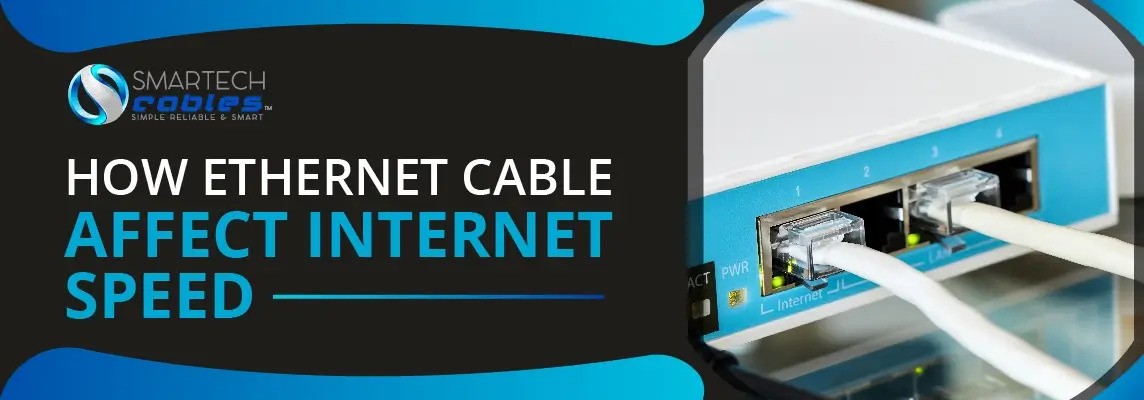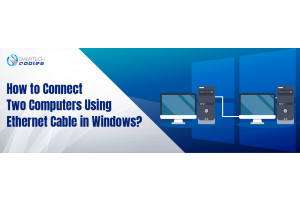How do different ethernet cables affect internet speed?

Bulk Ethernet cables are used widely for networking applications in local area networks. One of the most common applications of bulk ethernet cables is that they are used for internet connections and different ethernet cables support different internet speeds.
So in this article, we will discuss the factors that affect the internet speed in different ethernet cables. We will individually discuss the factors that affect internet speed on the most common categories of ethernet cables. Read on to learn more.
Ethernet cable and internet speed
Ethernet cables by design are made to transfer data from one electronic device to another without lagging. The speed of your internet connection actually depends on your broadband connection. For instance, if you have a 1 K.V solar panel installed on your roof, the job of the electric cable is to transfer that power to your batteries.
Similarly, the job of the ethernet cables is to transfer your data at the speed at which your devices send it. But sometimes, due to substandard cables and networking equipment, the internet speed might slow down. However, in most cases, ethernet cables and accessories function perfectly to maintain the speed of your broadband package.
The following are the factors that are most likely to affect your internet speed.
Cable shielding
If your cable is shielded, your internet speed will noticeably improve. The shielded around the cable conductors prevent EMI and crosstalk from interfering with signal transmission and keep the integrity of the signals.
On the other hand, if you are using unshielded ethernet cables, they might suffer from EMI and crosstalk from the surrounding cables. This is particularly prevalent when your local area network is riddled with networking cables. You can minimize that by using a patch panel to organize your cables.
Cable conductor
Good quality cables are always made with bare copper conductors. If you are using cables that have bare copper conductors, you will notice a significant improvement in the overall performance of the cable.
The other type of conductor is copper-clad aluminum (CCA). CCA conductors are plated with a bare copper layer to enhance their performance. But it does not necessarily enhance it for long. Over long-term use, the copper cladding wears out and the aluminum is not as good a conductor as bare copper, so you will notice a decline in the performance of the cable.
Cable Run Length
A lot of people underestimate the importance of this factor. Cable run-length is the distance at which an ethernet cable is laid. The maximum recommended run length for ethernet cables is 100 meters and when you run the cable at lengths longer than that, the cable will not perform at its promised capacity. Meaning, a decline in internet speed. And if you run your cable at shorter lengths than recommended, the internet speed of your network will increase.
Cable accessories
If you are tired of slower internet speeds, you first need to upgrade your broadband package. And if you still need a boost in your data transmission rate, you need to buy top-notch ethernet cable accessories.
For instance, this Cat6 RJ45 Keystone Jack’s pins are plated with gold that ensures the efficiency of your data transmission. Similarly, you need to buy accessories that are certified by industry regulatory bodies such as EIA/TIA.
Ethernet Cable Types and their Internet Speeds
The following are the most common categories of bulk Ethernet cables. Read on to learn about how they affect internet speed.
Cat5e Cable
The enhanced category 5 cables are most commonly used in home and small-scale business networks. These cables have a data transfer rate of 100 Mbps over a length of 100 meters and their bandwidth capacity is 350 MHz.
Cat6 Cables
Category 6 cables have a data transmission speed of 1 Gbps over 100 meters and up to 10 Gbps over 50 meters. Moreover, it has a bandwidth capacity of 550 MHz which is ideal for high-speed data transmission.
Cat6a Cables
Frankly, you can never complain about Cat6a ethernet cables 1000ft. With a data transfer speed of up to 10 Gbps over 100 meters and a bandwidth capacity of 750 MHz, these cables cater to all sorts of high-speed networking needs.
SmarTech Cables
For cutting-edge ethernet cables or accessories, check out Smartech Cables. We are the industry leader in manufacturing high-performance networking cables and accessories. Our products exceed the industry standards and we are offering market competitive prices, coupled with free shipping on orders above $100. If you need assistance, our professional customer support team is available.






